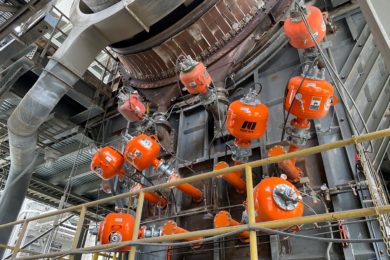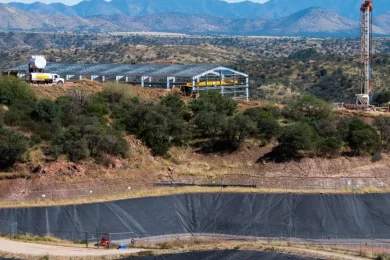While all eyes in the mining market are currently on Anglo American’s fuel cell electric vehicle (FCEV) 290 ton mining truck which is being developed with Williams Advanced Engineering, with hydrogen fuel cells from Ballard Power Systems and first trials still set for this year, it was actually last December 2019 when China’s leading large engines manufacturer Weichai Power announced that the first domestic FCEV for mining, a 200 ton hydrogen fuel-lithium battery mixed energy mining truck, had been completed together with CRRC Yongji, with the truck itself then revealed for the first time to the public in January this year.
The truck project was also supported by the China Hydrogen Alliance and the National Energy Group, with the truck itself and core control system provided by CRRC Yongji. CRRC is itself a major domestic mining truck OEM and recently launched its CR240E 240 ton electric drive truck via division CRRC Datong though the parent company CRRC is mainly known for its leading position in the rail industry including supplying China’s high speed trains.
CRRC Yongji started to develop the new electric energy trucks with Weichai Group in April 2019, and replaced the traditional diesel generator system with a hydrogen fuel cell-lithium battery hybrid energy system. The control system uses a step-down chopping method, driving the motor power up to 1,100 kW, with traction and braking functions, anti-skid during operation (anti-spin), with maximum speed control, differential control, running status detection and display, overvoltage, overcurrent, grounding and other protection.
In addition to the advantages of energy saving and emission reduction, the replacement of a diesel heavy truck with hydrogen energy the companies argue is also more cost-effective in terms of use cost. Based on 45 round trips per vehicle per day, a vehicle can save 20 t of fuel per day, which is equivalent to saving 21,739 litres of diesel (1 litre equals 0.92 kg). Calculated on the basis of saving one litre of diesel and reducing 2.63 kg of carbon dioxide, it is equivalent to reducing 57,174 kg of carbon dioxide emissions (about 57 t) per vehicle per day, so has a significant energy saving effect.










